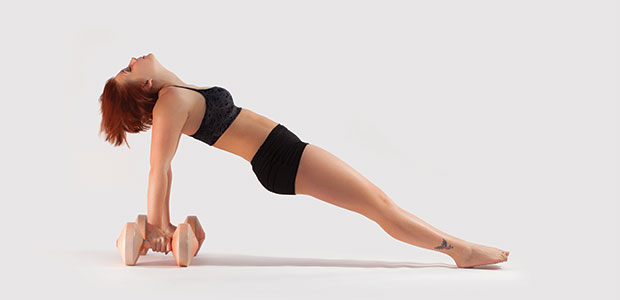
The key to achieving your fitness goals is to create a plan for success. Set SMART goals and keep them front and centre to keep you on track.
Like most Canadians, your number one New Year’s resolution is optimal health, or rather its pursuit. This undoubtedly includes improving fitness. Forsake those sour cream and onion chips screaming at you from your cupboard; here’s the plan for fitness success!
Get SMART
The first step in getting more active is to sit down—and plan. As my eighth grade guidance counsellor routinely reminded us, if you fail to plan, you plan to fail. Decide on your top two health-related goals and write them down. Don’t worry if this feels overwhelming; you will be doing some editing.
The first rule for goals is to make them SMART:
- Specific—what, why, who, where, which?
- Measurable—how much, how many, how will I know when it’s accomplished?
- Attainable—how can I accomplish the goal?
- Realistic—will it work?
- Time-bound—when, how much time?
Get timely
As you work on your goal-setting ideas, you may notice that your initial goals have been modified; perhaps they have even mutated. Your goals, though much clearer, may still seem scary and unattainable. At this juncture, it is critical to focus on your timeline.
Let’s say your goal is to lose 30 pounds in six months (even in January the beach is calling!). Thirty pounds as a whole is a lot of weight to lose. Breaking that down to five pounds per month is more reasonable. But breaking that number down even further to a weekly goal of 1.25 pounds is downright achievable.
Of course, fitness and activity is only one piece of the pie, so to speak. Weight-loss success is only as good as your caloric-intake-minus-caloric-expenditure ratio. If you are serious about losing weight, contact a nutritionist or visit your local health food store for advice.
Get checked
Mentally, you are enthusiastic and ready to start a fitness routine, but you need to be sure that you are physically ready as well. If you have any doubts, consult your health care practitioner; share your plan (that’s right, you get to show it off!), and get their approval—and admiration.
Get real
Once you are cleared for take-off, be sure not to come out of the gates too hard. A common mistake when first committing to a new fitness regimen is to push too hard too soon. This can serve to make you so sore for the next week that it hurts just to lie in bed or go to the bathroom, let alone lift a dumbbell or tread on a mill.
Get help
If you use machines at the gym, ask staff there to show you how to use them properly, rather than watching other people on the machines and mimicking them. In my experience, too many gym-goers use machines improperly or dangerously—and the last thing I want is for that plague to spread.
Get personal
Planning to succeed should include looking ahead and affirming that you can stick to your regimen and exercise regularly. This will require the evolution of your fitness plan. If you have the resources, consider working with a personal trainer to keep your workouts fresh.
Along with making your gym visits fun, changing up your routine also serves other purposes. For starters, it helps to avoid plateauing—where your body becomes accustomed to a routine and adapts by finding the easiest way to do it. This could bring your results, gains, and goal achievements to a grinding halt. In addition, changing up your routine may develop other muscles that weren’t being worked by the original plan.
Get over … hurdles
My guidance counsellor (a man of many clichés) also said, “Expect the unexpected. Life will throw you curveballs.”
Plan to adapt
Know that you will be going out to eat once in a while; you may have friends over for some pizza or wine; you may go on vacation. It’s going to happen, so plan accordingly. Choose a healthy option when you go to a restaurant; coerce your friends to go for a walk after eating or drinking; stay at a hotel with a fitness facility. Most importantly, if you stumble (“but my hubby brought home cheesecake!”), don’t be too hard on yourself. All is not lost. Just don’t make a habit of it.
Keep your goals front and centre
As Scottish poet, Robert Burns, said, “The best laid schemes of mice and men often go awry.” At some point during this year, you may come to hate the gym, hate exercising, hate eating with a healthful conscience. To combat these hateful moments, and to stay motivated, put your goals where you will see them. Refer to these goals every day.
Reward yourself regularly
Create a reward system. For example, if you go to the gym five out of the seven days this week, treat yourself to popcorn at the movies.
Buy some new workout duds
If you’re having trouble getting motivated to start your fitness routine in the first place, buy a new set of runners and workout clothes, something you would like to show off.
Find a workout buddy
Better yet, get an ally. Be fitness buddies with someone who is motivated—and motivating—so you can feed off each other and hold each other accountable.
A little low on energy?
Before
Before your workout, try eating foods rich in complex carbohydrates, such as vegetables, fruits, whole grains, and beans. Avoid the temptation to go for simple carbs, such as chocolate bars, jelly beans, and sugary energy drinks. Complex carbs will give you sustained energy without a serious crash an hour later.
Supplements
If you have trouble eating before a workout, consider supplements that contain green tea extract, capsaicin (red pepper), Asian ginseng, and bitter orange (synephrine). These are natural and safe energy boosters that will help you sustain energy.
After
Following your workout, replenish the energy stores you just burned with more complex carbs, but also include foods that are high in protein to repair muscle fibres. Foods such as eggs, fish, poultry, and nuts are all good options. And, most importantly, drink plenty of water to rehydrate.
Get back … on the horse
If you have fallen off-track somewhere along the way and are looking for a few spicy exercises to breathe life back in to your program, give the following workout a whirl.
Trapeze Push-up Dips (3 sets of 8 reps)
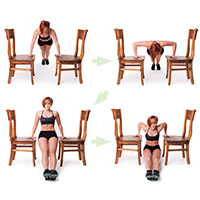
Muscles targeted: chest, triceps, deltoids, abdominals
- Begin in a push-up position with each hand on chairs that are shoulder-width apart.
- Complete a push-up, and then, with straight arms, swing your lower body forward until your feet are on the ground and your legs are as if you are sitting in a chair, feet slightly out in front of knees.
- Immediately after completing a dip where your arms bend to almost 90 degrees at the elbows, straighten your arms and swing your feet back to starting position.
Easier: To make this exercise easier you may divide the leg swing distance into two motions, touching your feet down in between the chairs on the way forward and backward.
Walkout Push-ups (3 sets of 12 reps)
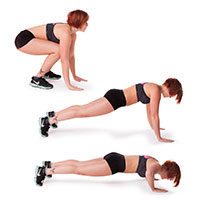
Muscles targeted: quadriceps, chest, abdominals, triceps
- Begin with feet hip-width apart.
- Keeping your heels touching the ground, squat down as if sitting on a chair until your hands touch the ground in front of you.
- Allowing your heels to lift off the ground, slowly walk your hands out in front of you until you are in a push-up position, with hands slightly wider than shoulder-width apart.
- Complete a push-up and then walk your hands back toward your toes until you can plant your heels on the ground again.
- Stand up to starting position.
Harder: To progress this exercise to a more advanced level, do it on one leg.
Bridge Row and Press (3 sets of 12 reps)
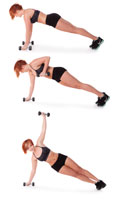
Muscles targeted: rhomboids, deltoids, obliques, transversus abdominis
- Begin in a push-up position with a dumbbell in your right hand.
- While keeping your elbow close to your body, pull your wrist up to the bottom of your rib cage.
- Once your wrist gets to your side, twist your hips all the way open to the right side, allowing your feet to flip over on their sides.
- Keeping your hips up, press the dumbbell straight up in the air over your body.
- Bring it back down to your side, twist back onto your toes, and then return the dumbbell to starting position.
- Repeat starting with the dumbbell in your left hand.
Dumbbell Swing and Shuffle (3 sets of 15 reps)
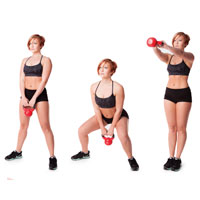
Muscles targeted: gluteals, quadriceps, transversus abdominis, deltoids
- Begin by holding the bell part of the weight, arms relaxed, feet shoulder-width apart.
- As you squat down with a flat back, swing the dumbbell back between your legs.
- As you stand up, thrust your hips forward to create enough momentum to carry the dumbbell, and your straight, relaxed arms up to chest height.
- As the dumbbell reaches its peak, step your left foot beside your right and quickly step your right foot back out to shoulder width just in time to squat down and have the dumbbell travel back between your legs.
- The next rep will go back to the left side in the same manner.
It is important to keep your back flat, your chest up, and your arms relaxed. This is a continuous exercise that relies on momentum and hip drive.



































